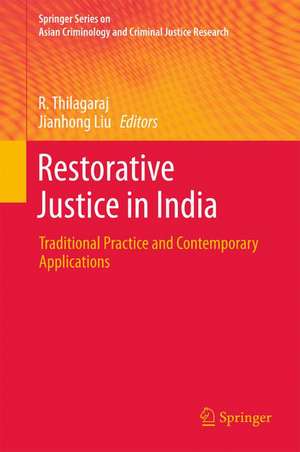Restorative Justice in India: Traditional Practice and Contemporary Applications: Springer Series on Asian Criminology and Criminal Justice Research
Editat de R. Thilagaraj, Jianhong Liuen Limba Engleză Hardback – 13 iul 2017
India has a rich tradition of restorative justice, and this work introduces both the traditional basis and contemporary practices of this justice system in India, in a comprehensive and systematic way.
The contributions to this work cover three main areas:
I. The Tradition of Restorative Justice in India II. The Development of Restorative Justice inIndia
III. Restorative Justice Practices in India
The third part – “Practices” covers special topics: including Restorative Justice and the Court, Restorative Justice and Incarceration, Restorative Justice and Juveniles, and Restorative Justice and Woman.
The book covers the full range of the issues of restorative justice in India and will be a highly valuable resource book for researchers and upper level graduate students interested in alternative justice models in general, comparative criminology, and criminal justice in India specifically.
“A landmark volume in the history of restorative justice and criminology in India. Many outstanding scholars in this collection outline the Indian experience of restorative justice from which the world has much to learn.”
John Braithwaite Australian National University
| Toate formatele și edițiile | Preț | Express |
|---|---|---|
| Paperback (1) | 636.63 lei 6-8 săpt. | |
| Springer International Publishing – aug 2018 | 636.63 lei 6-8 săpt. | |
| Hardback (1) | 642.83 lei 6-8 săpt. | |
| Springer International Publishing – 13 iul 2017 | 642.83 lei 6-8 săpt. |
Preț: 642.83 lei
Preț vechi: 756.27 lei
-15% Nou
Puncte Express: 964
Preț estimativ în valută:
123.01€ • 128.75$ • 102.38£
123.01€ • 128.75$ • 102.38£
Carte tipărită la comandă
Livrare economică 31 martie-14 aprilie
Preluare comenzi: 021 569.72.76
Specificații
ISBN-13: 9783319476582
ISBN-10: 3319476580
Pagini: 198
Ilustrații: XVII, 198 p. 3 illus., 1 illus. in color.
Dimensiuni: 155 x 235 mm
Greutate: 0.49 kg
Ediția:1st ed. 2017
Editura: Springer International Publishing
Colecția Springer
Seria Springer Series on Asian Criminology and Criminal Justice Research
Locul publicării:Cham, Switzerland
ISBN-10: 3319476580
Pagini: 198
Ilustrații: XVII, 198 p. 3 illus., 1 illus. in color.
Dimensiuni: 155 x 235 mm
Greutate: 0.49 kg
Ediția:1st ed. 2017
Editura: Springer International Publishing
Colecția Springer
Seria Springer Series on Asian Criminology and Criminal Justice Research
Locul publicării:Cham, Switzerland
Cuprins
Preface.- Introduction: Restorative Justice for A Harmonious India.- Part 1: Restorative Justice Tradition in India.- Chapter 1. Nyaya Panchayat.- Chapter 2. Peace Negotiations and Dialogue in the Northeast: the Naga Case.- Part 2: Restorative Justice Development in India.-Chapter 3. Restorative Justice in India: Old and New.- Chapter 4. Compensatory Jurisprudence in India.- Chapter 5. Restorative Justice in the Indian Context: Some Views and Thoughts on the Framework and Process.- Chapter 6. A Justice that Heals: Restorative Justice from an Indian Perspective.- Part Three: Restorative Justice Practices in India.- Restorative Justice and Court.- Chapter 7. ‘Mediation’- An Overview of the Opportunity to Resolve Conflicts.- Chapter 8. Plea Bargaining in India: A tool to provide Restorative Justice?.- Restorative Justice and Prisoners.- Chapter 9. An Insight into the Importance of Restorative justice and the Rights of Offenders: An analysis of Issues of Convergence and Divergence.- Chapter 10. Justice and Reconciliation in the Aftermath of Mass Atrocities and Collective Violence: The Restorative Justice Lens.- Restorative Justice and Juveniles.- Chapter 11. Scope and Applicability of Restorative Justice for Juveniles in Conflict with the Law.- Restorative Justice and Woman.- Chapter 12. Applicability and Reception of Restorative Justice for Rape Victims.
Notă biografică
Professor R. Thilagaraj was former Chair and Professor in Criminology, Department of Criminology, University of Madras. Presently Director (Academic), Center of Excellence in Digital Forensics, Chennai and Chairman, Indian Society of Criminology. Recipient of ISC - Kumarappa Reckless Award and ISC - Prof. Sushil Chandra and Haikerwal Award for Senior Social Scientist.
Jianhong Liu is Professor at the University of Macau. He is the Winner of 2016 American Society of Criminology’s Freda Adler Distinguished Scholar Award. He is the Founding President of Asian Criminological Society, the President of Scientific Commission of International Society for Criminology, and the editor in chief of Asian Journal of Criminology. He is an author of more than 100 research articles and author or editor of 29 books.
Jianhong Liu is Professor at the University of Macau. He is the Winner of 2016 American Society of Criminology’s Freda Adler Distinguished Scholar Award. He is the Founding President of Asian Criminological Society, the President of Scientific Commission of International Society for Criminology, and the editor in chief of Asian Journal of Criminology. He is an author of more than 100 research articles and author or editor of 29 books.
Textul de pe ultima copertă
This book systematically introduces the practice of restorative justice in India, as a resource for comparative criminal justice research. “Restorative justice” focuses on the rehabilitation of offenders through reconciliation with victims, and with the community at large. It has gained momentum as a justice reform movement in Western countries within the past three decades, and it is estimated that up to one hundred countries worldwide utilize restorative justice practices. Within Western countries, it is seen largely a response or alternative to the perceived deficiencies of the existing criminal justice system.
India has a rich tradition of restorative justice, and this work introduces both the traditional basis and contemporary practices of this justice system in India, in a comprehensive and systematic way.
The contributions to this work cover three main areas:
I. The Tradition of Restorative Justice in India II. The Development of Restorative Justice in India
III. Restorative Justice Practices in India
The third part – “Practices” covers special topics: including Restorative Justice and the Court, Restorative Justice and Incarceration, Restorative Justice and Juveniles, and Restorative Justice and Woman.
The book covers the full range of the issues of restorative justice in India and will be a highly valuable resource book for researchers and upper level graduate students interested in alternative justice models in general, comparative criminology, and criminal justice in India specifically.
“A landmark volume in the history of restorative justice and criminology in India. Many outstanding scholars in this collection outline the Indian experience of restorative justice from which the world has much to learn.”
John Braithwaite Australian National University
India has a rich tradition of restorative justice, and this work introduces both the traditional basis and contemporary practices of this justice system in India, in a comprehensive and systematic way.
The contributions to this work cover three main areas:
I. The Tradition of Restorative Justice in India II. The Development of Restorative Justice in India
III. Restorative Justice Practices in India
The third part – “Practices” covers special topics: including Restorative Justice and the Court, Restorative Justice and Incarceration, Restorative Justice and Juveniles, and Restorative Justice and Woman.
The book covers the full range of the issues of restorative justice in India and will be a highly valuable resource book for researchers and upper level graduate students interested in alternative justice models in general, comparative criminology, and criminal justice in India specifically.
“A landmark volume in the history of restorative justice and criminology in India. Many outstanding scholars in this collection outline the Indian experience of restorative justice from which the world has much to learn.”
John Braithwaite Australian National University
Caracteristici
Provides a comprehensive overview of the history and development of restorative justice in India Examines contemporary practice of restorative justice in India Provides a comparative model for alternative justice practice, including its applications and challenges Includes supplementary material: sn.pub/extras























